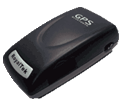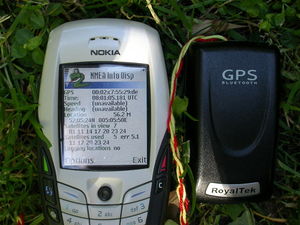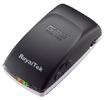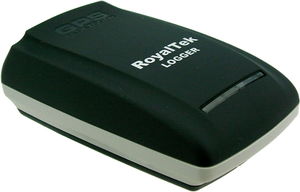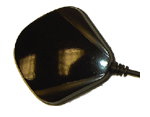Royaltek
Royaltek device descriptions
RoyalTek BT GPS mini RBT 1000
|
RoyalTek BT GPS x-mini RBT-2100
Same as RBT 1000, but this one has a SiRFstarIII chip. Replacable LiIon battery (Nokia compatible)
|
RoyalTek Mini Xtreme RBT-2110
Bluetooth device with SiRFstarIII chipset. Works out of the box under Linux. Very small, fits everywhere. Has useful rubber feets so it doesn't slide around in your car. Mine came with a car power adapter but no AC adapter. LiIon battery is replaceable.
|
RoyalTek GPS x-mini II RBT-2200/RBT-2210
|
RoyalTek RBT-2300
- SiRFstarIII GPS chipset
- 20 parallel channels
- 650,000 trackpoints
- Battery lasts 7 hours
- NMEA0183 compliant protocol
- Bluetooth
- Works with Linux (Jdatalog)
Pros
- Very cheap
- Huge memory
- You can use standard Nokia BL-4C batteries, more capacity
Cons
- No waypoint button
- Downloading data requires some knowledge
- No segmentation (all trackpoints are saved together by day, even if you switch off & on)
- Its a configuration flag, you can append or create new trackpoints.
- No on/off trackpoints switch
- Only includes a car charger (but a 5 V 0.4 A charger is cheap)
- In my case it also has a USB connector
RoyalTek BlueGPS RBT 3000
Bluetooth GPS data logger — no screen, minimal indicator lights. I don't have any experience of another GPS, so I really like it.
Good things
- Massive memory capacity — apparently it stores over 30,000 records. I have used it for a few hours every day on holiday and after two weeks still had spare capacity. I think you can fit more records on if you reduce the type of info it logs (not the frequency but the detail; e.g., no altitude)
- Bluetooth connectivity, no need for cables
- Configuration software (Linux software too) allows you to change everything about logging, data correction, elevation masks, SBAS (I haven't tried all these options). The logging control is great, the frequency can be set to anything from 1 sec to many hours
- Linux driver to extract data (I have never managed to build this on Mac OS X); Gentoo Ebuilds for Linux driver and config tool
Bad things
- No Mac software!
- No indication of full memory (so I have to keep track and often get it wrong)
- Indicator lights are counter-intuitive — when the green led is lit constantly, it is not locked onto a GPS signal. When it is flashing it has locked on and is recording.
- Can't change the battery (built-in lithium ion). But I have opened it up and it would be easy to swap them if you had a spare.
- need very much time for GPS-look. It flashes the green light, but it hasn't locked. Be careful with tracking!
- software for download the datas works not satisfactorily under
Linux andWindows-Pocket-PC (what's the problem?)
More info
RoyalTek Vnus GPS-Mouse RGM-3600
|
RoyalTek RGM-3800
- SiRFstarIII GPS chipset
- 20 parallel channels, WAAS/EGNOS, DOP-Support (HDOP, VDOP, satellites, 2D/3D)
- two standard alkaline AAA cells for about 12 hrs runtime
- two rechargeable NiMH AAA cells for about 9 hrs runtime (an option not mentioned in the manual but it's been tried and tested)
- size 34×24×64 mm without strap/belt, weight 68 g/42 g (with/without battery)
- not waterproof, but fits easily inside a condom.
- NMEA0183 compliant output
- Mini-USB Connection to PC
- Works with Linux (rgm3800py (german description), Jdatalog or rtkgps).
- Works with MacOS/Linux including old PPC-Platform, if USB-RS232-Driver for Profilec PL2303 is available via this python-script http://code.google.com/p/rgm3800py/
- Works with PocketPC http://aeropic.free.fr/RBT_2300/ (German, Spanish, Catalan, Hungarian version available. Windows-Desktop-versions available as well in those languages)
- 64 MiB flash memory for trackdata. Logging can be set in 5 levels (earlier units only offer the first three options out-of-the-box: get the firmware upgrade!).
- UTC Time, Longitude and Latitude
- UTC Time, Longitude, Latitude and Altitude
- UTC Time, Longitude, Latitude, Altitude and Velocity
- UTC Time, Longitude, Latitude, Altitude, Velocity and Distance
- UTC Time, Longitude, Latitude, Altitude, Velocity, Distance, Fixed Mode, Satellites, Fix, DOP and Course.
- Comes with min. 5 sec interval - after an firmware upgrade 1 to 60 seconds interval is possible. In a car 1 sec. interval works fine, by foot or by bicycle better use longer intervals.
- Recording interval and loglevel set by user. Defines range of memory.
- Memory-Full Options: Stop / Overwrite
- No button/key for marking waypoints, but each powercycling starts new track
- Direct paththrough of live NMEA available :"GPS mouse mode" via USB-RS232.
See also: detailed german page for RGM 3800 at the OSM-wiki
Summary
- Pro: tracks one of the best in SiRFstarIII-class (much better than RGM2300 or Garmin Etrex H family)
- Pro: switch on, clip on and forget for the rest of the day.
- Pro: standard batteries
- Pro: big memory
- Contra: no button for waypoints
- Contra: downloading via USB can take several minutes
- Contra: memory not expandable/no slot
- Contra: No battery low warning
- Contra: Under unknown rare conditions sometimes stops recording. After power cycling ok again.
RoyalTek RGM 2000
SiRFstarII Chipset USB2Serial Adapter. Can be programmed to output sirf-protocol or nmea with a terminal programm (windows = hyperterminal). A good Windows tool to programm the output is SiRFDemo. I use it with Linux, works fine for me.
RoyalTek MBT-1100
BT747 seems to be able to handle the RoyalTek MBT-1100 and it might be able to handle some of the other 'MBT'-devices too. The MBT devices are based on the MTK chipsets.
